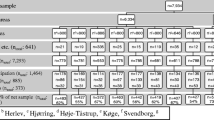Abstract
This study provides data on variations in subjective well-being among older residents of small towns in varying rural contexts. Standard structured interview data on five composite dimensions of well-being (mental health, activity, contact with friends/relatives, security) were gathered on 989 elderly residents across 18 small towns stratified by population (100–500; 501–1500; 1501–2500) and quantitatively-defined county rurality (high-medium-low). Similarities and differences in well-being among the nine town size/rurality categories resulting from this stratification are discussed, along with implications for rural gerontological research and intervention.
Similar content being viewed by others
References
Ansello, E. Antecedent principles in rural gerontology education. In P. Kim & C.P. Wilson (Eds.),Toward mental health of the rural elderly. Landover, MD: University Press of America, 1981.
Baele, C.L.The revival of population growth in nonmetropolitan America. Washing, D.C.: Economic Development Division, U.S. Department of Agriculture (ERS-605), 1975.
Berkman, B. Community mental health services for the elderly.Community Mental Health Review, 1977,2, 1–9.
Blake, B., & Lawton, M.P. Perceived community functions and the rural elderly.Educational Gerontology: An International Quarterly, 1980,5, 375–386.
Bradburn, N.The structure of psychological well-being. Chicago: Aldine, 1969.
Cutler N., & Harootyan, R. Demography of the aged. In D. Woodruff & J.E. Birren (Eds.),Aging: Prospects and issues. New York: Van Nostrand Reinhold, 1975.
Falk, W.W. & Pinhey, T.K. Making sense of the concept rural and doing rural sociology: An interpretive perspective.Rural Sociology, 1978,43, 547–558.
George, L.K. Subjective well-being: Conceptual and methodological issues. In C. Eisdorfer (Ed.),Annual review of gerontology and geriatrics (Vol. 2). New York: Springer Publishing, 1980.
Langner, T. A 22-item screening score of psychiatric symptoms indicating impairment.Journal of Health & Human Behavior, 1962,3, 269–276.
Lawton, M.P. The Philadelphia Geriatric Center Morale Scale: A revision.Journal of Gerontology, 1975,30, 85–89.
Lawton, M.P. The impact of the environment on aging and behavior. In J.E. Birren, & K.W. Schaie (Eds.),Handbook of the psychology of aging. New York: Van Nostrand Reinhold, 1977.
Lawton, M.P., Nahemow, L., & Teaff, J. Housing characteristics and the well-being of elderly tenants in federally assisted housing.Journal of Gerontology, 1975,30, 601–607.
Leighton, D.C., Harding, J.S., Macklin, D.B., MacMillian, A.M. & Leighton, A.H.The character of danger. New York: Basic Books, 1963.
Scheidt, R.J. Psychosocial environmental predictors of the mental health of the small-town rural elderly. In P. Kim & C. Wilson (Eds.),Toward mental health of the rural elderly. Landover, MD: University Press of America, 1981.
Smith, B.J., & Parvin, D.W., Jr. Comparative levels of rurality.Faculty Series No. FS74-2. Athens, Georgia: Agricultural Economics, University of Georgia, 1974.
U.S. Senate, Special Committee on Aging.Developments on aging: 1976 Part 1. Washington, D.C.: U.S. Government Printing Office, 1977.
Windley, P.G. The effects of ecological/architectural dimensions of small rural towns on the well-being of older people. In P. Kim & C. Wilson (Eds.),Toward mental health of the rural elderly. Landover, MD: University Press of America, 1981.
Windley, P.G., & Scheidt, R.J. The well-being of older persons in small rural towns: A town panel approach.Educational Gerontology: An International Quarterly, 1980a,5, 355–373.
Windley, P.G., & Scheidt, R.J. Person-environment dialectics: Implications for competent functioning in old age. In L. Poon (Ed.),Aging in the 1980's, Washington, D.C.: American Psychological Association, 1980b.
Windley, P., & Scheidt, R. An ecological model of health among small-town rural elderly.Journal of Gerontology, 1982,37, 235–242.
Author information
Authors and Affiliations
Additional information
This research was supported by NIMH Grant MH-31095-02.
Rights and permissions
About this article
Cite this article
Scheidt, R.J., Windley, P.G. Well-being profiles of small-town elderly in differing rural contexts. Community Ment Health J 18, 257–267 (1982). https://doi.org/10.1007/BF00754540
Issue Date:
DOI: https://doi.org/10.1007/BF00754540



